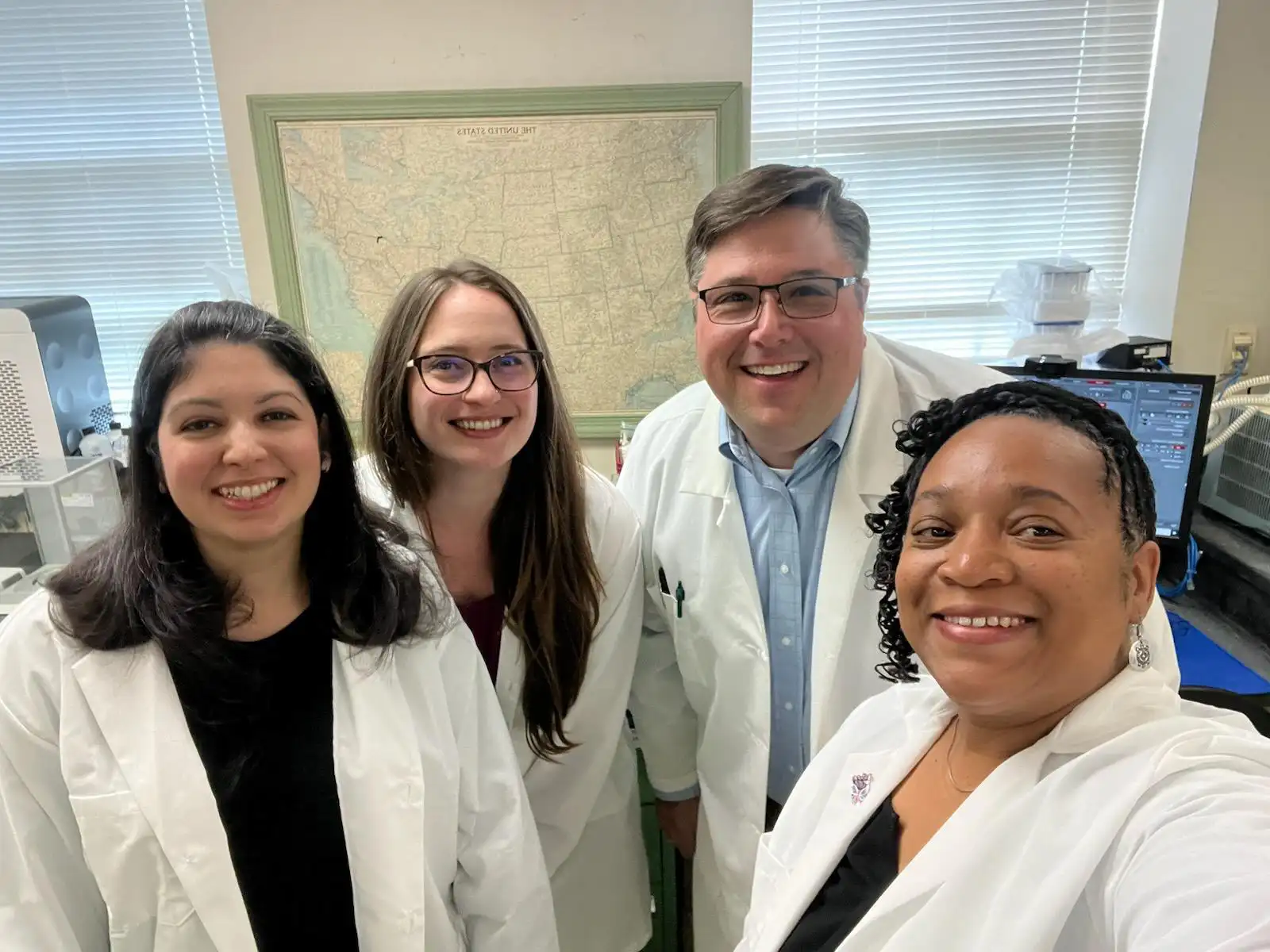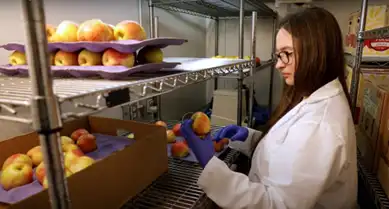USDA-ARS Research Microbiologist looks back on her ORISE fellowship experience
Meet Holly Bartholomew

Holly Bartholomew with her research team. From left to right: Dianiris Luciano-Rosario, Ph.D., Holly Bartholomew, Ph.D., Wayne M. Jurick II, Ph.D., Verneta L. Gaskins. (Photo Credit: Verneta L. Gaskins)
For high school, Holly Bartholomew, Ph.D., attended Loudoun Academy of Science, a science, technology, engineering and mathematics (STEM) magnet school. The early exposure to engaging research-based curriculum that was centered around finding answers to scientific mysteries established her love for biology. Fast forward, Bartholomew obtained her undergraduate degree in microbiology in 2015 from Virginia Tech. After completion of undergraduate studies, she elected to remain at Virginia Tech to complete her doctoral degree in biological sciences in 2020. Bartholomew loved her career research but was interested in exploring new opportunities outside of academic labs. After finding out about the Oak Ridge Institute for Science and Education (ORISE) through a Virginia Tech alum, Chris Clarke, Ph.D., Bartholomew found an opportunity with the United States Department of Agriculture (USDA) Agricultural Research Service (ARS). With a passion in agricultural microbiology, she was drawn to contribute to projects in the Food Quality Lab under Wayne M. Jurick II, Ph.D., and Jorge Fonseca, Ph.D. Her project contributions were focused on tritrophic interactions between microbes, plants and toxins in a postharvest system.

Holly Bartholomew’s research aimed to combat food waste and human health concerns in response to blue mold decay of pome fruit. (Photo Credit: Steve Ausmus)
The USDA ARS Research Participation Program provides opportunities for students, postgraduates, established scientists and faculty to participate in programs, projects and activities at ARS-designated facilities to help ARS solve agricultural problems of high national priority.
Bartholomew’s research focus was to study Penicillium expansum, which causes blue mold decay in pome fruit—apple, pear, quice, during postharvest storage and produces the harmful mycotoxin, patulin. These fungal diseases cause significant economic losses to the food industry annually while also posing human health and food waste concerns. The research team also looked at novel ways to combat the fungus that helps to avoid fungicide resistance.
“By comparing P. expansum with less virulent fungal species, I was able to look for genes and compounds that P. expansum produce that help promote infection or give it a competitive advantage in those postharvest interactions with the apple and other fungi present,” she said. “Learning more about how the fungus causes disease and mechanisms controlling mycotoxin production allows us develop ways to intercept or target the fungus to decrease or eliminate rot, disable patulin production, or both.”
Through extensive research, Bartholomew and her co-researchers gained a better understanding of apple blue mold decay and the role of patulin during infection which was a significant step towards the development of new mitigation strategies, since the toxin alone helps the fungus cause decay in the fruit.
During her fellowship, Bartholomew co-authored five first-author publications adding to an additional five co-authored publications. She presented her postdoctoral research at 13 international, national and regional conferences, eight of which were invited oral presentations. Her most recent publication is titled Avirulent Isolates of Penicillium chrysogenum to Control the Blue Mold of Apple Caused by P. expansum.
It is important to step back and remember the big picture of why you are doing the work, and never forget the curiosity, passion and drive that led you to start the project.
Bartholomew highlighted the invaluable experiences she gained while with the program including expanded lab research experience and understanding, mentor relationships and networking. She is also grateful to have chosen a different pathosystem than her graduate studies. Bartholomew believes that it allowed her to expand upon her expertise and understanding of her past and current research.
“A major part of the internship is to gain new skillsets and expand your knowledge within your field,” she said. “Learn from your mentor the information beyond the science that fits a federal position, as government facilities are run very differently than those in academic institutions and industry.”
After the completion of her fellowship, Bartholomew continued her career in research with the USDA-ARS moving to the Invasive Insect Biocontrol and Behavior Laboratory in Beltsville, Maryland. Her research program focuses on the discovery and characterization of insecticidal bacteria, mainly Chromobacterium species and Bacillus thuringiensis. Her current goal is to find or improve upon bacteria and natural products to use against invasive insect pests as alternatives or supplements to traditional chemical pesticides.
Bartholomew encourages current and future interns to find the positives in research and suggests embracing both positive and negative results as they’re both clues in the process.
“It is important to step back and remember the big picture of why you are doing the work, and never forget the curiosity, passion and drive that led you to start the project.”
The USDA ARS Research Participation Program is funded by USDA and is administered through the U.S. Department of Energy’s (DOE) Oak Ridge Institute for Science and Education (ORISE). ORISE is managed for DOE by ORAU.

